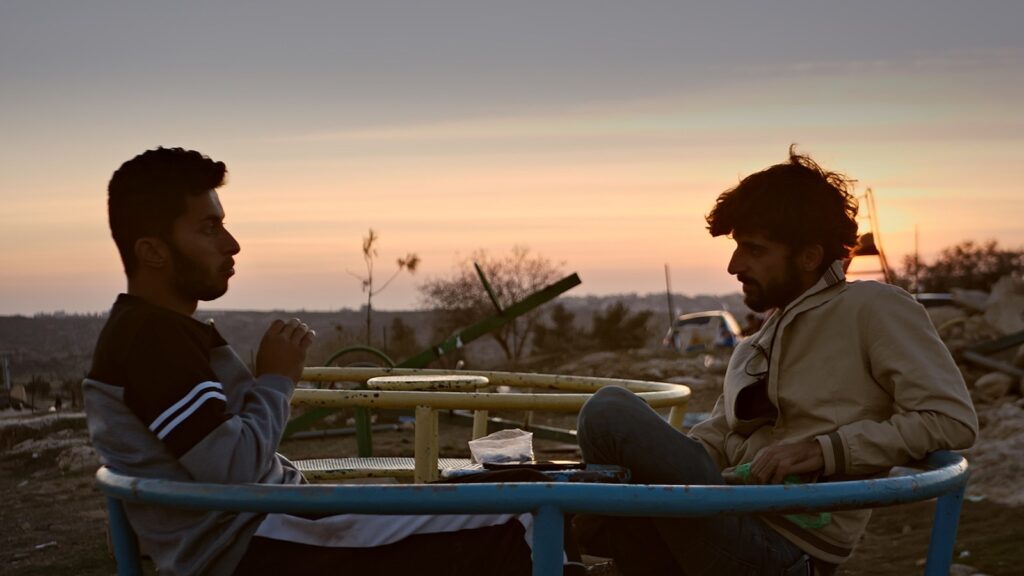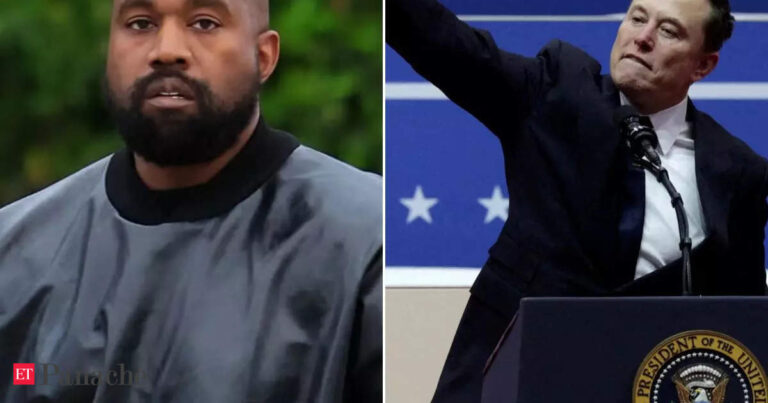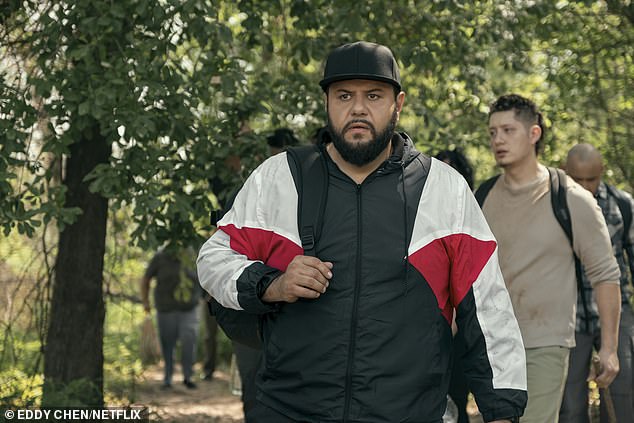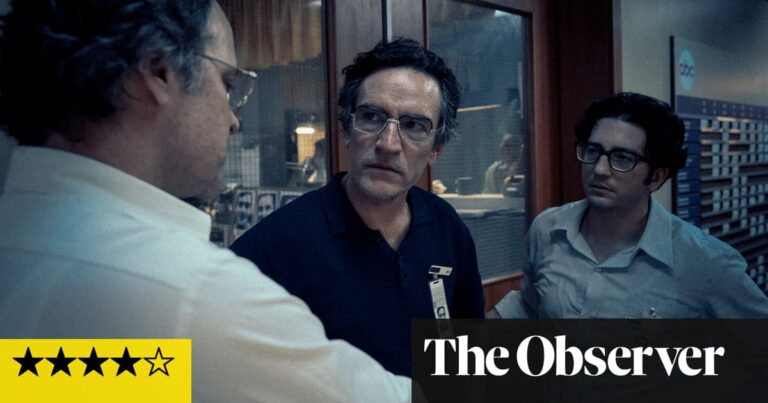
Since its premiere at the Berlin International Film Festival last February, No Other Land, a documentary about the Israeli occupation of the West Bank, has won dozens of critics awards and earned a coveted Oscar nomination for Best Documentary Feature. But the harrowing film, co-directed by Basel Adra, Hamdan Ballal, Yuval Abraham, and Rachel Szor, has yet to find distribution in the United States. Its limited theatrical release here (it is currently open in New York and L.A., expanding to roughly 15 other U.S. cities next week) is entirely independent, with many studios avoiding a film that showcases the violent treatment of Palestinians in the West Bank by Israel.
The documentary grew out of footage Adra began filming as a teenager in his home of Masafer Yatta, an area of the West Bank that has been under constant threat of destruction by the Israeli Defense Forces (IDF) and the Israeli government for decades. Several years ago, Adra met Abraham, an Israeli citizen and journalist who visited the West Bank looking to document the situation. The pair became unlikely friends and allies, with Abraham showing up regularly to support Adra’s activism. Once they began collaborating, it felt even more important to share the footage on a global level. The pair teamed up with Szor, an Israeli cinematographer, and Ballal, a Palestinian filmmaker and photographer, to create a cross-border activist collective. The group spent the past five years putting No Other Land together, with much of it shot prior to the Hamas attack on Oct. 7, 2023.
The film depicts the tumultuous situation in Masafer Yatta, a farming community that existed since before the inception of Israel. For years, the IDF has forced residents from their homes, bulldozed properties, and allowed Israeli settlers to attack Palestinian families — all of which is documented in No Other Land. The violence in the West Bank has increased since the Oct. 7 attack, and the recent ceasefire between Israel and Hamas has only made things worse in the region. In fact, according to an Al Jazeera report that cites the Palestinian Ministry of Health, the IDF has killed more than 70 people, including 10 children, in the West Bank since the beginning of the year during large-scale military operations, making the film even more timely.
“It’s great that we’re nominated [for an Oscar] and people are talking about it, but in a few months they will move on to the next film or the next thing,” Abraham tells Rolling Stone, speaking over Zoom from Israel along with Adra, speaking from the West Bank. “And we are going to continue our work. It’s our life’s mission to end the injustice that is going on here and to make this place better. This is why we are not placing all of our emotion and heart on this Oscar, because it’s just the statue at the end of the day. It’s important because it raises awareness for the film. And we are grateful that we were nominated. But we also try to keep things in the right proportion, because people here are dying every single day. Gaza is destroyed as a place. Basel’s community might not exist in a few years if there is no change in U.S. foreign policy. Hamdan’s house could be destroyed at any moment.”
He adds, of the present circumstances, “With the statue or without the statue, things are really, really, really bad. Symbols are helpful, but we need action and we need change. Even the Oscar statue cannot save Hamdan’s house. We are continuing to use these symbols to try to create change, which is unfortunately not coming yet.”
Here, Adra and Abraham discuss the making of No Other Land and what they hope viewers do after seeing it.
Before we talk about the film, can you describe the current situation in the West Bank?
Basel Adra: Two days after the ceasefire in Gaza took place [on Jan. 19], the Israeli government issued a military campaign on the West Bank. Literally all of the West Bank cities and towns and communities are under a siege. Soldiers are [there] 24 hours at checkpoints, making people’s lives miserable. At some of the checkpoints, you will find thousands of cars waiting. At some hundreds or dozens — it depends on the checkpoint. In the West Bank, dozens of people have been killed, including children, and ethnic cleansing is taking place in the camps. There are bombardments of residents’ homes and demolition of them. The area where I live, which is called Area C, which is 60 percent of the West Bank, is under daily attacks and harassment by soldiers and settlers. It has been crazy in the last few weeks. [Israeli] settlers invaded the community where my friend lives — they burned his car and attacked his family, including two children. Two days ago another friend and colleague had his home [invaded] by 20 to 30 settlers, and they smashed his car and they tried to smash his home and other homes in the community. To speak about the details would take hours, because what is going on is really crazy. It’s never been as bad as it is today. My whole life is affected by what’s going on.
When you originally started filming what was happening in Masafer Yatta, was it simply to document the situation?
BA: Yes. I did not imagine I would make a movie, because when I started I was a teenager. I didn’t know much about the world of filmmaking or where I could get with this footage. I started [filming] to have a document, from the perspective that it’s important to show the truth, the reality, the daily life, what’s going on, and also the power of evidence that we should have.
Once the two of you met, how did that impact the story you wanted to tell?
BA: All of the time, we were thinking, “What should we do with this footage?” We sometimes used it on social media or sent it to human rights organizations for them to publish. Yuval joined as a journalist to write about what was going on. Rachel was around with a camera filming. We didn’t have an idea at first. We decided we wanted to make a movie after a few times of meeting and having been in the field together, along with the other co-director, Hamdan. We liked the idea, although none of us had experience of doing long documentary. We started the journey together about five years ago.
Yuval Abraham: It was very clear to us from the beginning that we were witnessing — Basel all his life and me as I began to come every week — something horrific that the Israeli military was doing. I remember us sitting at Basel’s house and we would see people being kicked out of their houses and their houses bulldozed and trucks pouring cement into water wells. And then we’d open the media, the Israeli media and the international media, and we didn’t see anything about it. It was very clear to us from the beginning that we want to tell the story of this community that is fighting to survive, that is being forcibly transferred from their lands so the land can go to the [Israeli] settlements in the area. We agreed between the four of us that since it’s quite tricky to do a film as a collective, not only because we’re Israeli and Palestinian, but generally for people to make decisions together, that we would have to have a full consensus on everything. When we looked at the material, we noticed different kinds of things and we made different kinds of decisions.
What’s an example of that?
YA: We included some of the conversations me and Basel had in the film. We thought it would be interesting to look at the power imbalance between Israelis and Palestinians through our own characters. And there are so many families that are devastated by this policy, but we decided to focus on one family, the family of Harun Abu Aram, who was shot and ended up being killed just because he wanted to have a generator the soldiers wanted to confiscate. So we started with this initial thought about what we would want to tell, to shed light on the atrocities that are happening in Masafer Yatta, and I think the film got more layers over time as we worked on it.
How many hours of footage did you have in total?
YA: I’m not sure we ever counted, but basically it was 20 years-plus of community filming by Basel, his family, and friends. And then we were filming for five years and we filmed a lot. We filmed everything, all the time. It was a huge challenge to edit it. It was thousands of hours of footage.
In the film, we see the IDF soldiers try to stop you from filming. Were there experiences or situations that you weren’t able to capture for the documentary?
BA: Unfortunately, yeah. They always try to make it hard for us to get to places and to film. Many times they would go destroy a place or structures, and when they recognized our cars they would set up a checkpoint with one of their Jeeps in the middle of the road to block us and to stop us. To check our IDs and the cameras and to waste our time until the bulldozer could destroy the place. During attacks by settlers or soldiers, they would issue military “closed area” orders so only the soldiers were allowed to be there — although they allowed the settlers to be there as well. If we came to film, they would try to arrest us. In 2020, I was physically attacked by four soldiers for carrying a camera and filming two settlers chasing a Palestinian. It was really one of the moments that I will never forget. It was very scary. And there was a moment in the movie itself about two years ago when I was also physically attacked by soldiers for filming like them. My home was invaded multiple times. One time they came to confiscate cameras and the laptop and the car that I used alongside with other activists. They always try to prevent the documentation. They don’t want people to see what they’re doing here.
Ultimately, why do you feel it’s so important that people outside of the Middle East get to see what’s going on there?
BA: It’s important for people to know the reality. We live in a situation full of injustice. A lot of times we feel a bias from the mainstream media. For example, they believe what the Israeli army spokesperson would say about the significant issue and they would take the Israeli narrative. Masafer Yatta, today, the vast majority of it is under threat of demolition by the Israeli government. And the Israeli government would say the Palestinians are building illegally and they are just destroying because of the [current military occupation], which [I believe] is not true. The law is imposed on us by power. It’s a military law. The issue on the ground is they are pushing us out of our land to build settlements. The law here is [used as] a weapon to make our existence as Palestinians illegal and the existence of these settlers, who they come from all over the world, the legal thing.
Has the global recognition the film has received helped your fight?
BA: So far, it has not. That’s the sad part. The movie is doing very well outside, in festivals, among audiences, and having a focus from media. But the situation on the ground is going very badly. And then we see [Donald] Trump’s administration and how they behave and how they speak about the situation here and their plan of the ethnic cleansing of Palestinians and all the shitty words that he’s saying. So, unfortunately, it has not, and the future does not look promising.
How did you feel when No Other Land was nominated for an Oscar?
YA: At the end of the day, we are documentarians. As activists and as journalists and as filmmakers, we are documenting something in reality and we’re doing that because we want people to see what we are seeing. To me, the main value of the Oscar nomination is that it will get more people to see the film and to see what we are documenting. When we made it we always thought between ourselves, “Will people see it?” We were afraid it would just be our parents. We edited the movie basically in a cave in Masafer Yatta. We didn’t have a big, sophisticated budget. And we are going to continue to document, because that is what we do. I don’t know how effective it is and I can still hope it will have some effect eventually. But right now, as Basel said, it’s very hard to see the light at the end of the tunnel.
BA: We never imagined that we’d be nominated for the Oscar or that we’d be going there. But it’s a great thing. It’s great for the community, for the story of the community, and we hope that one day our work will positively affect the situation on the ground.
Will you be able to attend the Oscars?
YA: We will. But Hamdan doesn’t have the visa yet. So we hope under Trump [that] because he’s an Oscar nominee he will get it. We don’t know. And Basel wants to invite his family and the family of Hamdan and my family, so we have to see if it will be possible. For a Palestinian to travel abroad, it’s not only about the visa process. There is also three checkpoints you have to cross: the Israel military, the Palestinian Authority, and the Jordanian checkpoints. Because Palestinians don’t have an airport and the military can decide anything at any time. Every time we travel, I feel it’s like a miracle that we manage to do it. We haven’t managed to do it a lot because of the situation. But it’s important that the four of us be there together.
The film is currently nominated for a BAFTA and an Oscar, but it doesn’t currently have distribution in the U.S. Why has that been such a challenge to get?
YA: You have a president who [this week] literally said two million people from Gaza need to be transferred to other countries, calling for the ethnic cleansing of an entire region. He said the United States will own Gaza. Maybe that’s part of the answer. You have in your country people who are politically extremely racist, and are hesitant to criticize Israeli policies that I, as an Israeli, want to criticize so that things can change. Not only are they not [speaking up], they are very much complicit whenever a Palestinian house is destroyed in Masafer Yatta. The U.S. supports, both financially and diplomatically, the Israeli occupation and is allowing it to continue to happen. They’re not using their leverage to enforce some kind of political solution that will guarantee equality for everybody, for the Palestinians and the Israelis. So I think it’s political. If this was a film about another subject that aligns with the way the U.S. perceives its geopolitical interests, we would now have the film with a big distributor. But I’m still hopeful that it will change. There is a huge, huge demand for the film in the United States. Why not have a conversation, even if you disagree with us? Why censor? Why not allow it to be out there so things can be seen and visible and there can be a public conversation about this very important issue that the U.S. is largely responsible for?
What feeling do you want to leave people with at the end of No Other Land?
YA: It was important for us that there will be two emotions. One is the dread, which is the experience of the community of Masafer Yatta, which is being destroyed. But then we also wanted there to be some emotion of power and hope. The people there are not just victims. They are surviving. They are holding on to their lands. They are living life. We wanted to have this mix of feelings, where you feel how hard things are, because reality is very, very hard, but also you leave with some willingness to act and some active emotion in your heart.
BA: I want people to feel some responsibility. That they will help us get out of this. Today with this disappointing situation, they are our hope. And we hope that they will act.



